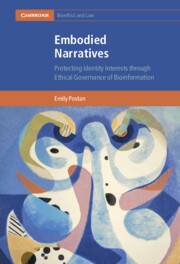29 results
4 - Bioinformation in Embodied Identity Narratives
-
- Book:
- Embodied Narratives
- Published online:
- 02 July 2022
- Print publication:
- 14 July 2022, pp 89-119
-
- Chapter
-
- You have access
- Open access
- HTML
- Export citation
1 - Attending to Identity
-
- Book:
- Embodied Narratives
- Published online:
- 02 July 2022
- Print publication:
- 14 July 2022, pp 1-30
-
- Chapter
-
- You have access
- Open access
- HTML
- Export citation
Table of Cases
-
- Book:
- Embodied Narratives
- Published online:
- 02 July 2022
- Print publication:
- 14 July 2022, pp xiv-xiv
-
- Chapter
-
- You have access
- Open access
- HTML
- Export citation
3 - Narrative Self-Constitution
-
- Book:
- Embodied Narratives
- Published online:
- 02 July 2022
- Print publication:
- 14 July 2022, pp 61-88
-
- Chapter
-
- You have access
- Open access
- HTML
- Export citation
2 - Mapping the Landscape
-
- Book:
- Embodied Narratives
- Published online:
- 02 July 2022
- Print publication:
- 14 July 2022, pp 31-60
-
- Chapter
-
- You have access
- Open access
- HTML
- Export citation
6 - Locating Identity Interests
-
- Book:
- Embodied Narratives
- Published online:
- 02 July 2022
- Print publication:
- 14 July 2022, pp 181-217
-
- Chapter
-
- You have access
- Open access
- HTML
- Export citation
7 - Responsibilities for Disclosure
-
- Book:
- Embodied Narratives
- Published online:
- 02 July 2022
- Print publication:
- 14 July 2022, pp 218-246
-
- Chapter
-
- You have access
- Open access
- HTML
- Export citation
Bibliography
-
- Book:
- Embodied Narratives
- Published online:
- 02 July 2022
- Print publication:
- 14 July 2022, pp 264-286
-
- Chapter
-
- You have access
- Open access
- HTML
- Export citation
Copyright page
-
- Book:
- Embodied Narratives
- Published online:
- 02 July 2022
- Print publication:
- 14 July 2022, pp iv-iv
-
- Chapter
-
- You have access
- Open access
- HTML
- Export citation
Index
-
- Book:
- Embodied Narratives
- Published online:
- 02 July 2022
- Print publication:
- 14 July 2022, pp 287-296
-
- Chapter
-
- You have access
- Open access
- HTML
- Export citation
Acknowledgements
-
- Book:
- Embodied Narratives
- Published online:
- 02 July 2022
- Print publication:
- 14 July 2022, pp xii-xiii
-
- Chapter
-
- You have access
- Open access
- HTML
- Export citation
8 - Protecting Identity in Practice
-
- Book:
- Embodied Narratives
- Published online:
- 02 July 2022
- Print publication:
- 14 July 2022, pp 247-263
-
- Chapter
-
- You have access
- Open access
- HTML
- Export citation
Foreword
-
- Book:
- Embodied Narratives
- Published online:
- 02 July 2022
- Print publication:
- 14 July 2022, pp ix-xi
-
- Chapter
-
- You have access
- Open access
- HTML
- Export citation
5 - Encounters with Bioinformation: Three Examples
-
- Book:
- Embodied Narratives
- Published online:
- 02 July 2022
- Print publication:
- 14 July 2022, pp 120-180
-
- Chapter
-
- You have access
- Open access
- HTML
- Export citation
Contents
-
- Book:
- Embodied Narratives
- Published online:
- 02 July 2022
- Print publication:
- 14 July 2022, pp v-viii
-
- Chapter
-
- You have access
- Open access
- HTML
- Export citation

Embodied Narratives
- Protecting Identity Interests through Ethical Governance of Bioinformation
-
- Published online:
- 02 July 2022
- Print publication:
- 14 July 2022
-
- Book
-
- You have access
- Open access
- Export citation
1 - ‘Doing’ Medical Law and Ethics
-
-
- Book:
- Law and Legacy in Medical Jurisprudence
- Published online:
- 23 December 2021
- Print publication:
- 10 March 2022, pp 21-42
-
- Chapter
- Export citation
Acknowledgements
-
- Book:
- The Cambridge Handbook of Health Research Regulation
- Published online:
- 09 June 2021
- Print publication:
- 24 June 2021, pp xix-xx
-
- Chapter
-
- You have access
- Open access
- HTML
- Export citation
Dedication
-
- Book:
- The Cambridge Handbook of Health Research Regulation
- Published online:
- 09 June 2021
- Print publication:
- 24 June 2021, pp v-vi
-
- Chapter
-
- You have access
- Open access
- HTML
- Export citation
Copyright page
-
- Book:
- The Cambridge Handbook of Health Research Regulation
- Published online:
- 09 June 2021
- Print publication:
- 24 June 2021, pp iv-iv
-
- Chapter
-
- You have access
- Open access
- HTML
- Export citation

